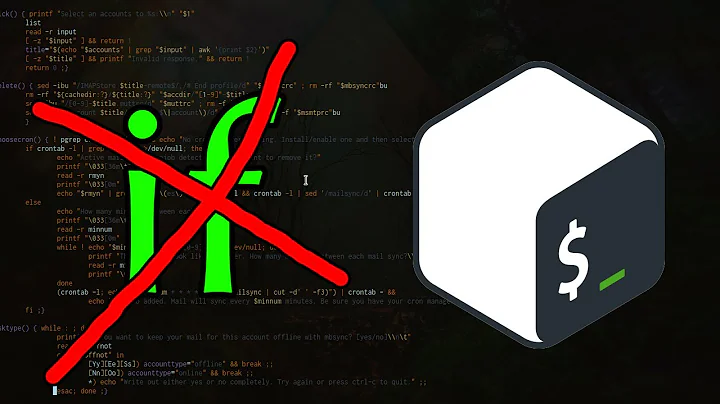Shell logical not
Solution 1
portability consideration.
The ! keyword is POSIX but not Bourne while ! has been supported by the [/test command from the start.
So [ ! ... ] is more portable than ! [ ... ].
Otherwise, as long as you don't use the deprecated -o and -a binary operators, they should be equivalent (if we put aside the parsing bugs in some old test/[ implementations).
Actually, in the Bourne shell, to do
if ! cmd1; then
cmd2
fi
You had to do:
if cmd1; then
:
else
cmd2
fi
(or use cmd1 || cmd2, though that could result in a different exit status in the end).
interaction with set -o errexit / set -e / ERR trap
Outside of the condition part of if/fi statements, as noted by @mosvy, another difference between [ ! ... ] and ! [ ... ] is that the latter will not cause the shell to exit when ! [ ... ] returns false and the errexit option is on.
! applied to any pipeline cancels the effect of errexit as the shell considers the exit status of the pipeline is being used as a condition. The same applies for failing-pipeline || cmd or failing-pipeline && cmd...
While with [ ! ... ], ! is just a regular argument passed to the [ command and in the end as far as the shell and errexit is concerned, it's just a [ command returning with either a success or failure exit status.
$ sh -ec '[ ! a = a ]; echo here'; echo "$?"
1
$ sh -ec '! [ a = a ]; echo here'; echo "$?"
here
0
That doesn't apply when those commands are run as part of the condition section of if/while/until statements, as in there, errexit doesn't apply.
The same applies to the ERR trap of Korn-like shells:
$ ksh -c 'trap "echo OUCH" ERR; ! [ a = a ]'
$ ksh -c 'trap "echo OUCH" ERR; [ ! a = a ]'
OUCH
In practice that likely won't make a difference as [ is almost always used as a condition, where errexit doesn't apply (whether it's in if/while/until statements or followed by &&/||).
Solution 2
[ … ] is equal to test …, so ! [ … ] is equal to ! test …. That means, you negate the result of the command test. In this case, ! is a shell command.
From info bash, e.g. in section «pipelines»:
If the reserved word `!' precedes the pipeline, the exit status is the logical negation of the exit status as described above.
On the other side, [ ! … ] means test ! …. That means, you negate an expression within test. See ! in man test:
! EXPRESSION
EXPRESSION is false
So it can have a different meaning. If you have complex expressions, the negation may only apply to a part.
It is up to you, what you prefere.
Related videos on Youtube
Comments
-
teknoraver almost 2 years
what is preferred between
if ! [ ... ]; thenand
if [ ! ... ]; thenactually they do the same result, is there a preferred syntax? in the former syntax the evaluated not is the shell builtin, while in the latter the not is the
testone, does it make any difference?-
Angel Todorov over 7 yearsThe shell will have
test/[/[[builtin too. I'd say whatever makes your code easier to read -
drHogan over 7 yearsThe first one looks more familiar to me because you use it with other commands than
testtoo. I don't remember many use cases where I've used!as argument fortest. The most often used expressions have their own opposite expression.
-
-
 gogoud over 7 yearsI wasn't aware that
gogoud over 7 yearsI wasn't aware that-oand-awere deprecated inside single square brackets or withtest, myman testdoesn't say that they are. Are there alternatives (still using single square brackets ortest)? -
 Stéphane Chazelas over 7 years@gogoud, yes using
Stéphane Chazelas over 7 years@gogoud, yes using-oand-amake for unreliable expressions, use[ ... ] && [ ... ]. See the POSIX spec for thetestutility -
mosvy almost 5 yearsThere's yet another difference -- it's how they interact with
set -e. Comparesh -ce '[ ! foo ]; echo yupvssh -ce '! [ foo ]; echo yup -
 Stéphane Chazelas almost 5 years@mosvy, good point, though it doesn't apply in the condition part in an
Stéphane Chazelas almost 5 years@mosvy, good point, though it doesn't apply in the condition part in anifstatement like in the OP's question. I'll add a note about it unless you want to add your own answer.





